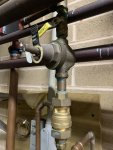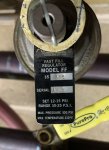Dirt Buster
Member
For one of my self serve bays the radiant floor heat system has struggled the last couple winters due to a small leak underground that we have been unable to find. To combat this - we put a 15 gallon tank in our attic with a float to fill up the tank more if the fluid runs low. But with the system no longer being pressurized the taco pump 0011-F4 wasn’t getting enough flow to fire up the system well. So I installed a small transfer pump right after the 15 gallon tank to supply some pressure to the taco pump which is 20-25 feet away. That worked but the transfer pumps are not lasting. And I know they are meant for continuous use. Does anyone have any recommendations on which pump to use right after the 15 gallon tank? Can a taco pump run on just a gravity feed? I’m thinking to put a 007 taco right after the tank instead of the transfer pump but not sure if it will work






